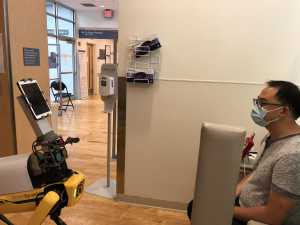Author Interviews, COVID -19 Coronavirus, JAMA, Pediatrics, Pulmonary Disease / 04.03.2021
Study Finds Face Masks Safe in Children and Should Be Encouraged
MedicalResearch.com Interview with:
Dott.ssa Silvia Bloise MD
Prof. Riccardo Lubrano MD PhD
Pediatric and Neonatology Unit
Maternal and Child Department
Sapienza University of Rome
Rome Italy
MedicalResearch.com: What is the background for this study?
Response: Pending new evidence, the universal facial masking, with other preventive measures remain the only strategies to limit the spread of SARS-CoV-2 infection. The use of face mask is particularly debated in the children, especially in younger children. Therefore, we wanted to test whether their in children was associated with episodes of desaturation or respiratory distress.
(more…)



 MedicalResearch.com: What is the background for this study? What are some of the functions that Dr. Spot can facilitate?
Response: During the COVID-19 pandemic, we wanted to consider innovative methods to provide additional social distance for physicians evaluating low acuity individuals who may have COVID-19 disease in the emergency department. While other health systems had instituted processes like evaluating patients from outside of emergency department rooms or calling patients to obtain a history, we considered the use of a mobile robotic system in collaboration with Boston Dynamics to provide telemedicine triage on an agile platform that could be navigated around a busy emergency department. Dr. Spot was built with a camera system to help an operator navigate it through an emergency department into a patient room where an on-board tablet would permit face-to-face triage and assessment of individuals.
MedicalResearch.com: What is the background for this study? What are some of the functions that Dr. Spot can facilitate?
Response: During the COVID-19 pandemic, we wanted to consider innovative methods to provide additional social distance for physicians evaluating low acuity individuals who may have COVID-19 disease in the emergency department. While other health systems had instituted processes like evaluating patients from outside of emergency department rooms or calling patients to obtain a history, we considered the use of a mobile robotic system in collaboration with Boston Dynamics to provide telemedicine triage on an agile platform that could be navigated around a busy emergency department. Dr. Spot was built with a camera system to help an operator navigate it through an emergency department into a patient room where an on-board tablet would permit face-to-face triage and assessment of individuals.


 Laura M. Bogart, PhD
Senior Behavioral Scientist
RAND Corporation
Santa Monica, CA 90407-2138
MedicalResearch.com: What is the background for this study?
Response: Recent media polls continue to show that Black Americans are less likely to intend to get the COVID-19 vaccine than White Americans, and initial state data show a similar racial/ethnic disparity in vaccination rates. Initial uptake of the vaccine has been significantly affected by inequities in vaccine access and supply. In addition to these challenges, other factors contribute to hesitancy around vaccination, including self-perceived risk of infection, trust in the vaccine itself, trust in healthcare systems, healthcare providers, and policymakers who support the vaccine, and trust in the pharmaceutical industry and clinical research. In this study, we conducted a survey of a nationally representative sample of 207 Black Americans in late 2020, after initial COVID-19 vaccine effectiveness and safety data were released to the public. We also did in-depth interviews with a subsample of those surveyed who said that they would not get vaccinated. In addition, we engaged with a stakeholder advisory committee comprised of individuals who represent different subgroups and organizations in Black communities in the U.S., in order to discuss the results and make recommendations for policies to increase COVID-19 vaccination among Black Americans.
Laura M. Bogart, PhD
Senior Behavioral Scientist
RAND Corporation
Santa Monica, CA 90407-2138
MedicalResearch.com: What is the background for this study?
Response: Recent media polls continue to show that Black Americans are less likely to intend to get the COVID-19 vaccine than White Americans, and initial state data show a similar racial/ethnic disparity in vaccination rates. Initial uptake of the vaccine has been significantly affected by inequities in vaccine access and supply. In addition to these challenges, other factors contribute to hesitancy around vaccination, including self-perceived risk of infection, trust in the vaccine itself, trust in healthcare systems, healthcare providers, and policymakers who support the vaccine, and trust in the pharmaceutical industry and clinical research. In this study, we conducted a survey of a nationally representative sample of 207 Black Americans in late 2020, after initial COVID-19 vaccine effectiveness and safety data were released to the public. We also did in-depth interviews with a subsample of those surveyed who said that they would not get vaccinated. In addition, we engaged with a stakeholder advisory committee comprised of individuals who represent different subgroups and organizations in Black communities in the U.S., in order to discuss the results and make recommendations for policies to increase COVID-19 vaccination among Black Americans. 





 Catharina Svanborg M.D., Ph.D.
Professor at Lund University Department of Laboratory Medicine,
Division of Microbiology, Immunology and Glycobiology
Founder/Chairman of the Board at HAMLET Pharma
MedicalResearch.com: What is the background for this study?
Catharina Svanborg M.D., Ph.D.
Professor at Lund University Department of Laboratory Medicine,
Division of Microbiology, Immunology and Glycobiology
Founder/Chairman of the Board at HAMLET Pharma
MedicalResearch.com: What is the background for this study?





 Kathryn Foti, PhD, MPH
Postdoctoral fellow
Department of Epidemiology
Johns Hopkins Bloomberg School of Public Health
MedicalResearch.com: What is the background for this study?
Response: The Kidney Disease: Improving Global Outcomes (KDIGO) 2021 Clinical Practice Guideline for the Management of Blood Pressure (BP) in Chronic Kidney Disease (CKD) provides recommendations for the management of BP in individuals with nondialysis CKD, incorporating new evidence since the publication of its previous guideline in 2012.
The 2021 KDIGO guideline recommends a target systolic BP <120 mmHg based on standardized office BP measurement. This BP goal is largely informed by the findings of the SPRINT trial which found targeting SBP <120 mmHg compared with <140 mmHg reduced the risk of cardiovascular disease by 25% and all-cause mortality by 27%. The benefits were similar for participants with and without CKD.
In our study, we sought to examine the potential implications of the 2021 KDIGO guideline for BP lowering among US adults with CKD compared to the 2012 KDIGO guideline (target BP ≤130/80 mmHg in adults with albuminuria or ≤140/90 mmHg or under without albuminuria) and the 2017 American College of Cardiology/American Heart Association (target BP <130/80 mmHg) guideline. Additionally, we determined implications of the 2021 KDIGO guideline for angiotensin converting enzyme inhibitor (ACEi) or angiotensin II-receptor blocker (ARB) use for those with albuminuria (recommended at systolic BP ≥120 mmHg) compared to the 2012 KDIGO guideline (recommended at BP >130/80 mmHg).
Kathryn Foti, PhD, MPH
Postdoctoral fellow
Department of Epidemiology
Johns Hopkins Bloomberg School of Public Health
MedicalResearch.com: What is the background for this study?
Response: The Kidney Disease: Improving Global Outcomes (KDIGO) 2021 Clinical Practice Guideline for the Management of Blood Pressure (BP) in Chronic Kidney Disease (CKD) provides recommendations for the management of BP in individuals with nondialysis CKD, incorporating new evidence since the publication of its previous guideline in 2012.
The 2021 KDIGO guideline recommends a target systolic BP <120 mmHg based on standardized office BP measurement. This BP goal is largely informed by the findings of the SPRINT trial which found targeting SBP <120 mmHg compared with <140 mmHg reduced the risk of cardiovascular disease by 25% and all-cause mortality by 27%. The benefits were similar for participants with and without CKD.
In our study, we sought to examine the potential implications of the 2021 KDIGO guideline for BP lowering among US adults with CKD compared to the 2012 KDIGO guideline (target BP ≤130/80 mmHg in adults with albuminuria or ≤140/90 mmHg or under without albuminuria) and the 2017 American College of Cardiology/American Heart Association (target BP <130/80 mmHg) guideline. Additionally, we determined implications of the 2021 KDIGO guideline for angiotensin converting enzyme inhibitor (ACEi) or angiotensin II-receptor blocker (ARB) use for those with albuminuria (recommended at systolic BP ≥120 mmHg) compared to the 2012 KDIGO guideline (recommended at BP >130/80 mmHg). 












